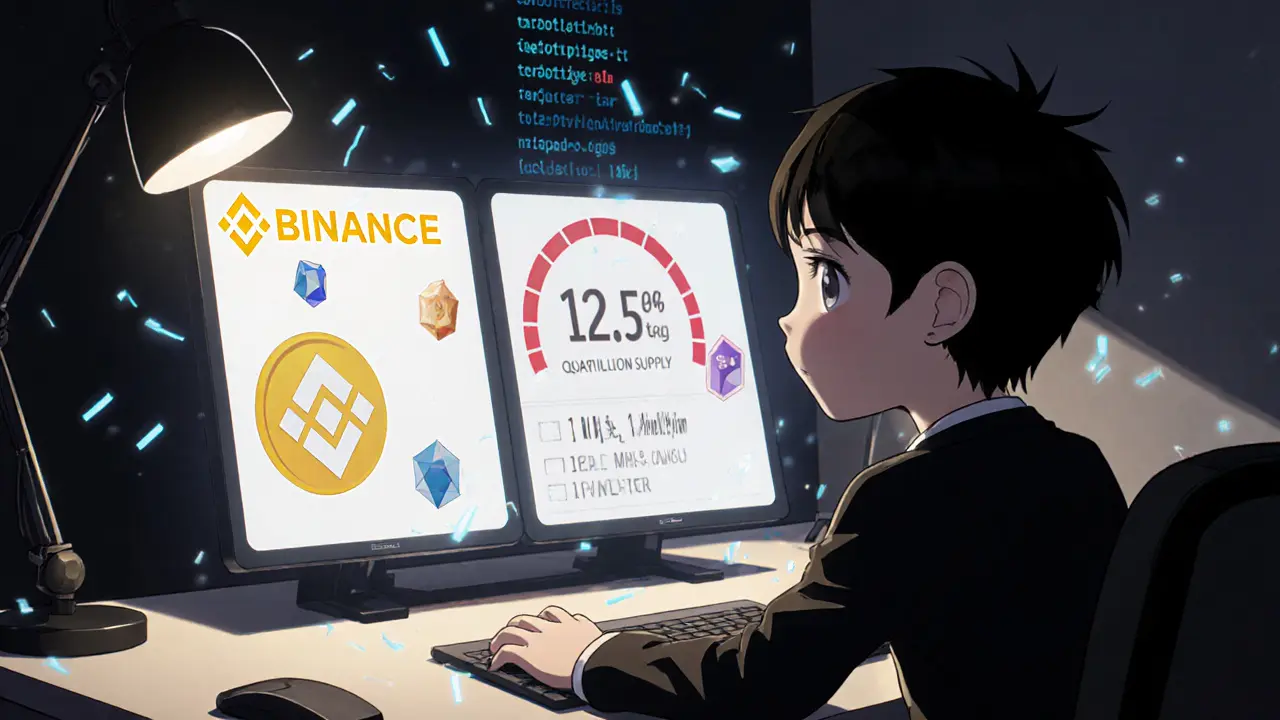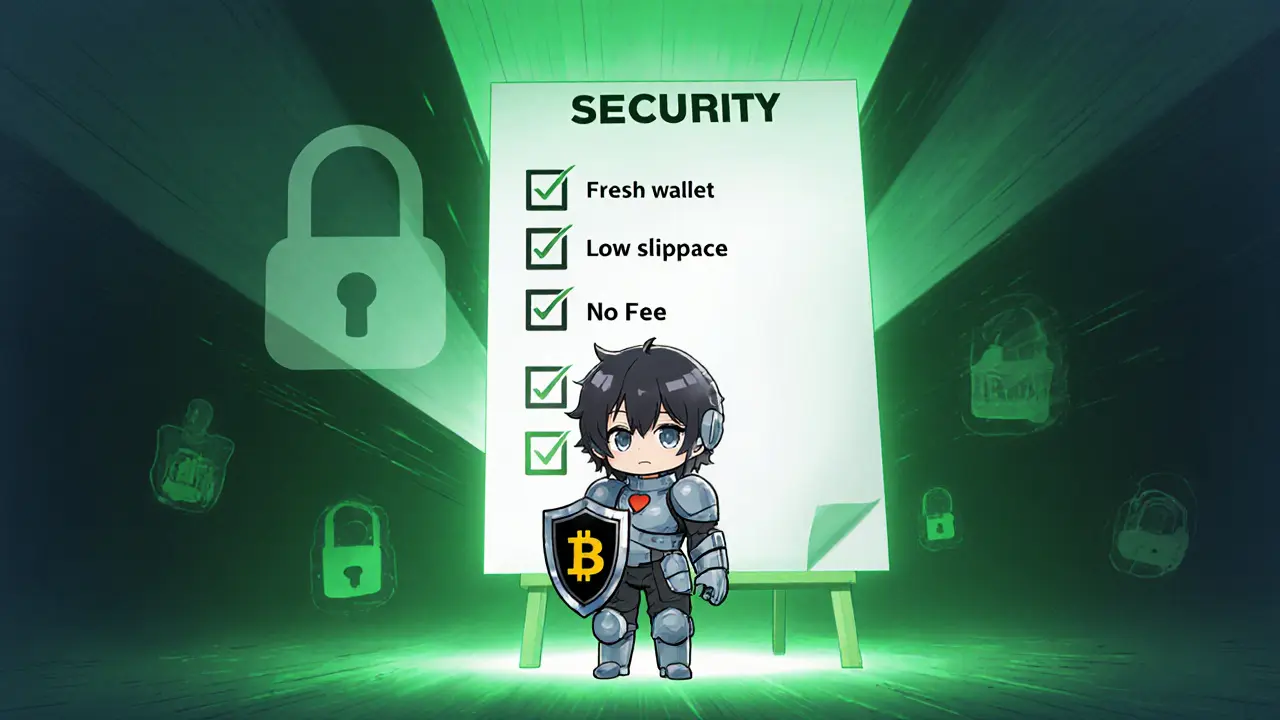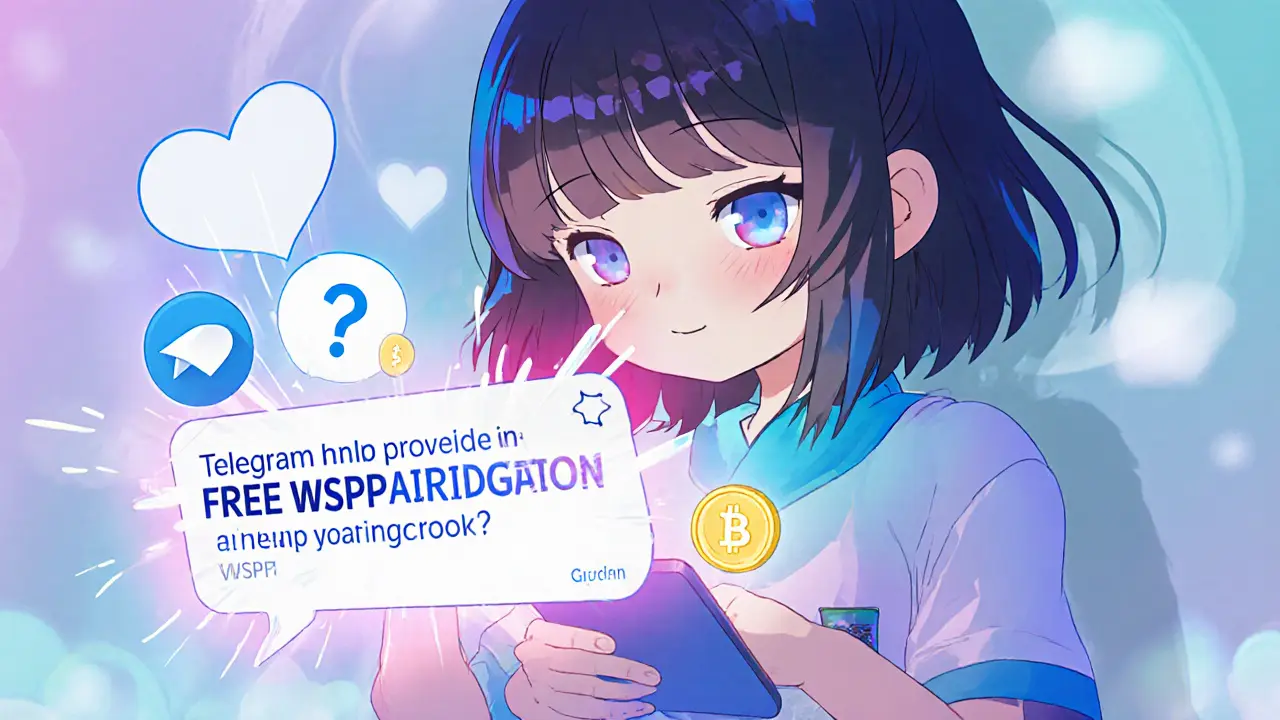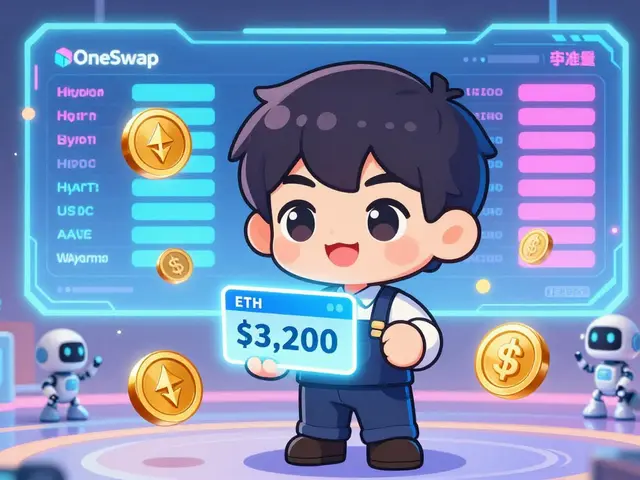WSPP Sell Tax Calculator
Calculate your potential losses when selling WSPP tokens due to the extremely high hidden taxes (90%+). This tool helps you understand why WSPP is considered a high-risk scam asset.
WSPP Sell Tax Calculator
Enter how many WSPP tokens you have to see how much you'll actually receive after the hidden tax.
High Sell Tax Warning
This token has extremely high hidden taxes (90%+ on sales)
Quick Takeaways
- WSPP runs on both Binance Smart Chain and Polygon with a total supply of 13.5 quadrillion tokens.
- Current price is below $0.000001 per token and daily trading volume is under $10,000.
- Claims of a charitable "airdrop" are not listed on reputable airdrop trackers and match known scam patterns.
- Liquidity is extremely low; selling often incurs hidden taxes of 90%+.
- If you consider any interaction, use a fresh wallet, set strict slippage limits, and be ready to lose the entire investment.
People keep asking about the WSPP airdrop because the name sounds like a way to earn free crypto while helping the poor. The reality is far messier. Below we break down what the token actually is, where it lives, why the promised airdrop is almost certainly fake, and how you can protect yourself from losing money.
What Is WSPP?
WSPP is a cryptocurrency project that markets itself as the ‘first currency with a program to reduce world poverty’. The team behind it calls the full name Wolf Safe Poor People, but they rarely share a real roadmap, audited financials, or any partnership with established charities.
The token’s white‑paper (if you can find one) repeats the same buzzwords - “decentralized applications for poverty relief”, “peer‑to‑peer storage on Swarm”, and a vague claim of an audit by SolidityFinance. Unfortunately, no audit date or report is publicly linked, and the SolidityFinance site only lists a placeholder entry for WSPP.
Where Does the Token Live?
WSPP is deployed on two separate blockchains:
- Binance Smart Chain (BSC) - contract0x46d5…33d36f.
- Polygon - a second contract with a much lower market cap.
The BSC version ranks around #2267 on CoinMarketCap with a market cap of just under $1million, while the Polygon version sits near #3560 with a market cap of roughly $52. Both versions trade at fractions of a cent - actually $7.04e‑11USD per token, which translates to less than one‑ten‑billionth of a dollar.
Such a massive supply (13.5quadrillion tokens) and miniscule price are typical of meme‑style projects that rely on hype rather than real utility.

The Promised Airdrop - What’s Real and What’s Not
Every few weeks you’ll see posts on Telegram, Reddit, and random crypto forums shouting “FREE WSPP airdrop! Click here to claim”. None of the major airdrop aggregators - AirdropAlert, CoinMarketCap’s Airdrop page, or even the official Binance airdrop list - ever mention WSPP.
That omission is a huge red flag. Legitimate airdrops are usually announced on a project’s official website, verified social channels, and listed on tracking platforms so users can verify the details. In WSPP’s case, the only communication channel is a Telegram group called @robowolfproject. The group has no public membership stats and no pinned messages with a clear airdrop schedule.
Scam researchers at Chainalysis reported a 41% jump in airdrop‑themed scams in Q32025, and WSPP matches the pattern: a charitable hook, an ultra‑low token price, and a call‑to‑action that asks you to send a small amount of BNB or MATIC to a “distribution wallet”. Those wallets are often controlled by the scammers; once you send the fee, the so‑called airdrop never arrives.
How to Buy WSPP (If You Still Want To)
Even though we advise extreme caution, here’s the standard seven‑step process that appears on Binance’s “How to Buy” guide for obscure tokens:
- Download Trust Wallet (or any wallet that supports custom tokens).
- Buy BNB (for BSC) or MATIC (for Polygon) on a major exchange.
- Transfer the native coin to your wallet.
- Open the wallet’s DApp browser and navigate to PancakeSwap (BSC) or QuickSwap (Polygon).
- Paste the exact contract address (0x46d5…33d36f for BSC) into the “Import token” field.
- Set slippage tolerance to at least 12% - the contract imposes a hidden transfer tax that can eat 90‑95% of the amount on sells.
- Confirm the swap and wait for the transaction to finalize.
Every step carries a risk. Gas fees can spike, slippage settings can cause you to lose more than you expect, and the hidden tax means you’ll rarely be able to exit your position without losing almost everything.
Red Flags - Why Analysts Call WSPP a Scam
Multiple independent sources have flagged WSPP as high‑risk:
- CoinDesk labelled tokens with sub‑cent prices and quadrillion supplies as “speculative assets with minimal fundamental value”.
- CertiK’s 2024 DeFi Risk Report noted that charity‑themed tokens without transparent fund flows constitute 37% of detected scams.
- The SEC’s 2025 Enforcement Priorities specifically target “charity‑styled tokens with misleading impact claims”.
- Community feedback on Reddit’s r/CryptoCurrency and Binance forums repeatedly warns of “95% sell tax” and “impossible to sell” scenarios.
Liquidity is another killer. The 24‑hour trading volume sits under $10k, a drop of over 80% since January2025. With that little activity, price manipulation is easy and a buyer can be stuck with tokens that no one else wants to purchase.

Side‑by‑Side: BSC vs Polygon Version
| Attribute | BSC Version | Polygon Version |
|---|---|---|
| Contract address | 0x46d5…33d36f | 0x?? (not publicly listed) |
| Market cap (Oct62025) | ≈ $953,000 | ≈ $52 |
| 24‑h volume | $9,500 | $400 (declining) |
| Liquidity pools | PancakeSwap - very shallow | QuickSwap - negligible |
| Price per token | $7.04e‑11 | Similar micro‑fractional price |
| Community size | Few hundred active Telegram members | Even smaller, no official channel |
The BSC chain looks slightly better only because it has a higher market cap and a bit more volume. Both versions suffer from the same design flaws - ultra‑high supply, hidden taxes, and no verifiable charitable impact.
How to Protect Yourself From Fake Airdrop Scams
- Verify the source. Check if the airdrop is listed on reputable trackers or announced on an official website.
- Never send funds to claim free tokens. Legitimate airdrops never require you to pay a fee.
- Use a dedicated “throw‑away” wallet. If you accidentally interact with a scam, you won’t lose funds from your main wallet.
- Check the contract. Look up the token on BscScan or Polygonscan; inspect the tax settings and read community reviews.
- Set slippage low. High slippage is a sign the contract may impose massive fees on sell orders.
- Stay updated with security reports. Follow Chainalysis, CertiK, or the SEC for alerts on emerging scams.
By following these steps you can avoid the typical pitfalls that trap newcomers into losing their crypto on bogus airdrops.
Frequently Asked Questions
Is there an official WSPP airdrop happening right now?
No reputable airdrop tracker lists a current WSPP airdrop. Any claim you see on social media is likely a phishing attempt that asks for a small payment before “delivering” the tokens.
Can I safely buy WSPP for a short‑term trade?
The token’s liquidity is extremely low and it carries hidden sell taxes of 90‑95%. Even if you manage to buy, exiting without losing most of the position is almost impossible.
What evidence exists that WSPP actually helps the poor?
None. The project’s website and white‑paper provide vague statements but no audited financials, no partner charities, and no impact reports. Independent analysts label the claim as “poverty‑washing”.
How can I check if a contract has a hidden tax?
Open the contract on BscScan or Polygonscan, scroll to the "Read Contract" tab, and look for functions like taxFee or sellTax. Community forums often post the exact percentages (WSPP uses >90% on sells).
Should I report suspicious WSPP airdrop messages?
Yes. Forward phishing links to the platform where you saw them (Telegram, Reddit, etc.) and consider filing a report with your local consumer protection agency or the SEC’s crypto‑fraud hotline.
Bottom line: the allure of a free token that allegedly funds charity is strong, but the data points - tiny market cap, hidden taxes, no audit, no real‑world impact - all scream "stay away". If you’re looking for genuine crypto‑for‑good projects, research verified charities like GiveDirectly or reputable tokenized donation platforms instead of WSPP.




gayle Smith
October 13, 2025 AT 01:04Yo, that WSPP airdrop is basically a vanity metric circus, dripping buzzwords like “charity‑driven” while the hidden tax engine is guzzling 90% of your stash. The term “sell tax” sounds like a friendly fee, but it’s a stealthy tax‑taxonomy trap. If you’re not ready to watch your wallet evaporate, steer clear of the hype train. TL;DR: it's a financial black hole wrapped in philanthropic glitter.
mark noopa
October 13, 2025 AT 12:11It’s fascinating how the crypto ethos of decentralization gets weaponized into a veneer of altruism, essentially turning speculative zeal into a self‑sustaining Ponzi micro‑economy. When you contemplate the WSPP tokenomics, you’re staring at a tax structure that siphons over 90% of proceeds, a figure that dwarfs typical transaction fees by an order of magnitude. The psychological allure of a “free token for charity” exploits herd behavior, subtly nudging novices toward a loss‑laden sinkhole. One could argue that this is a sociotechnical experiment in how jargon can cloak malicious intent; the term “airdrop” itself becomes a euphemism for a redistribution of risk onto the uninformed. Moreover, the absence of an audit exacerbates asymmetrical information, fostering a playground for rug pulls under the guise of philanthropy. 🌐🚀 The platform’s lack of transparency is a red flag that should trigger any rational risk assessment model, especially when the token’s market cap is minuscule yet its tax architecture is absurdly aggressive. In essence, the WSPP project is a case study in how cryptographic hype can be engineered to function as a financial parasite, preying on the goodwill of would‑be donors. The embedded incentive structures are designed to funnel capital towards a single point of control, effectively nullifying any potential for genuine charitable impact. I’d advise anyone considering a stake to run a thorough due‑diligence protocol: check for audited code, verify the developers’ identities, and scrutinize the token’s smart‑contract logic for hidden tax clauses. If any of these elements are missing, it’s a clear indicator that the project is built on shaky foundations. The ethical implications are also worth noting; leveraging charitable narratives for profit undermines the credibility of legitimate blockchain‑based philanthropy. In the grand tapestry of the crypto ecosystem, projects like WSPP serve as cautionary tales that remind us to question the underlying motives behind every glossy whitepaper. 🚨💡 Bottom line: unless you enjoy watching your assets melt away, keep your distance and report suspicious activity to the appropriate channels.
Rama Julianto
October 13, 2025 AT 23:17Listen up, if you’re thinking this token is a shortcut to easy crypto‑charity, you’re dead‑wrong. The hidden 90% sell tax is a straight‑up robbery, and the lack of any reputable audit just confirms it’s a scam‑factory. Stop wasting time on a project that will bleed you dry the moment you try to cash out. Do yourself a favor and dump any WSPP you hold before it vanishes completely.
Helen Fitzgerald
October 14, 2025 AT 10:24Hey folks, just a heads‑up: if you see that “charity” angle, remember it’s often a bait‑and‑switch. The tax is insane, so stay vigilant and spread the word to keep others safe!
Jon Asher
October 14, 2025 AT 21:31Super simple – don’t buy it. The tax is way too high.
Scott Hall
October 15, 2025 AT 08:37Totally get the drama from the first post, but honestly, if you’re not ready to lose most of your tokens on a sell, just skip it. No need to get tangled in that tax maze.
Laura Myers
October 15, 2025 AT 19:44Wow, reading that deep dive is like watching a thriller where the villain is hidden in the fine print. 90% tax? That’s a horror story for your portfolio.
Sanjay Lago
October 16, 2025 AT 06:51Yo, I see the red flags, but let’s keep the vibe positive – there are legit crypto‑charities out there. Skip the WSPP and look for projects with audited contracts and transparent teams. You’ll feel better supporting something real.
arnab nath
October 16, 2025 AT 17:57Everyone’s talking about “charity” while the hidden tax is a covert siphon. It’s a classic control narrative – stay skeptical.
Nathan Van Myall
October 17, 2025 AT 05:04Interesting analysis. The tax burden is clearly designed to discourage liquidity, effectively locking investors in.
debby martha
October 17, 2025 AT 16:11Sounds risky.
Ted Lucas
October 18, 2025 AT 03:17🚀🚀🚀 The WSPP token is basically a tax‑bomb wrapped in philanthropy hype! If you’re not ready to watch 90% of your holdings evaporate, pull the plug now! 💥💥💥
ചഞ്ചൽ അനസൂയ
October 18, 2025 AT 14:24From a coaching perspective, it’s crucial to teach newcomers to read the fine print. Hidden taxes like this undermine any positive impact the project claims.
Annie McCullough
October 19, 2025 AT 01:31Honestly this sounds like a classic pump‑and‑dump disguised as charity its all marketing fluff but the tax tells it all
Carol Fisher
October 19, 2025 AT 12:37Patriots, beware! This token pretends to help but actually steals from our wallets. 🇺🇸🚨 Report it before it drains more honest investors.
Melanie Birt
October 19, 2025 AT 23:44Quick tip: always verify contract audits before investing. The 90% sell tax is a glaring red flag that says “stay away”. 👍
Lady Celeste
October 20, 2025 AT 10:51WSPP is a textbook scam; avoid.
Ethan Chambers
October 20, 2025 AT 21:57Well, if one enjoys a good tragedy, WSPP offers a masterclass in financial theatre. But for the rest of us seeking sane investments, it’s a no‑go.
Manas Patil
October 21, 2025 AT 09:04From a cultural standpoint, the misuse of charitable narratives erodes trust in crypto philanthropy worldwide. Let’s champion projects that truly benefit communities.
Philip Smart
October 21, 2025 AT 20:11Honestly, who needs another toxic token? This one’s just a glorified tax trap.
Jacob Moore
October 22, 2025 AT 07:17Friends, if you value your hard‑earned crypto, keep it far from WSPP. The hidden tax is a silent killer for any portfolio.
Orlando Lucas
October 22, 2025 AT 18:24Philosophically, the WSPP scenario underscores a broader dilemma: when does altruistic branding become a veil for exploitation? The token’s structure, with its crippling sell tax, suggests the answer lies in the incentives baked into the code. If a project’s reward system siphons the majority of value from participants, can it genuinely claim to serve a higher purpose? Moreover, the absence of external verification – no audits, no transparent governance – pushes the initiative into the realm of conjecture. In practice, investors are left to navigate a maze of hidden fees, making informed decision‑making nearly impossible. This dynamic not only harms individual holders but also erodes confidence in legitimate crypto‑charity efforts. Ultimately, the lesson here is clear: robust transparency and fair tokenomics are non‑negotiable if a project wishes to earn trust and deliver on its charitable promises.
Hanna Regehr
October 23, 2025 AT 05:31Just a reminder: always do your own research and stay away from tokens with excessive hidden taxes.